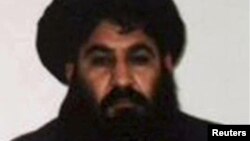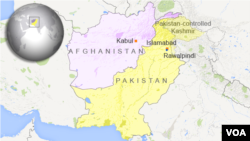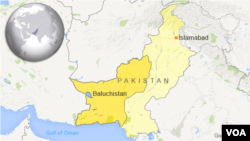U.S. military officials said Saturday that an American drone strike had most likely killed Afghan Taliban leader Mullah Akhtar Mansoor in a remote area of Pakistan near Afghanistan's border.
A U.S. official who spoke on background said President Barack Obama had authorized the strike, which occurred Saturday afternoon local time.
The official said several unmanned aircraft operated by U.S. special operations forces targeted a vehicle southwest of the town of Ahmad Wal in Pakistan's Baluchistan province. An adult male traveling with Mansoor was also most likely killed in the strike, the official said.
Initial reports appearing online and in news broadcasts in the region incorrectly asserted that Mansoor had been killed in Zabul province in Afghanistan.
The Afghan Taliban on Saturday released a statement calling those reports "baseless," but the group did not respond following news that he had been killed in Pakistan.
On Sunday, senior Afghan Taliban commander Mullah Abdul Rauf confirmed the death of Monsoor to The Associated Press, saying he was killed in a U.S. drone strike late Friday “in the Afghanistan-Pakistan border area.”
Rauf is so far the only Taliban official to publicly comment on the incident.
Involved in attacks
A statement from Pentagon press secretary Peter Cook said that as leader of the Afghan Taliban, Mansoor has been actively involved with planning attacks across Afghanistan and threatening Afghan civilians, security forces, and U.S. and allied troops.
"Mansoor has been an obstacle to peace and reconciliation between the government of Afghanistan and the Taliban, prohibiting Taliban leaders from participating in peace talks with the Afghan government that could lead to an end to the conflict," the statement said.
Cook said U.S. authorities were still assessing the results of the strike and would provide more information as it became available.
Damaging to leadership
If confirmed, the elimination of Mansoor would deal a critical blow to the Taliban.
The insurgent group has struggled with internal divisions over its leadership since July 2015, when it announced that its founder and first leader, Mullah Omar, had been dead for more than two years.
Saturday's strike appeared to be the first time that U.S. drones were known to have targeted Taliban fighters inside Baluchistan province.
All other known drone strikes inside Pakistan have occurred in the country's federally administered tribal areas, a semiautonomous region along the Afghan border where Pakistan's military has battled militants for years.
It is also rare for U.S. special forces to carry out drone strikes inside Pakistan. The CIA is typically in charge of the covert strikes, which target senior terrorist leaders in the country.
The United States has not designated the Afghan Taliban as a terrorist group. U.S. policy in Afghanistan generally allows coalition aircraft to target enemy fighters only when they can be identified as al-Qaida or Islamic State group loyalists, or when militants are directly threatening NATO personnel.
Earlier this month, a senior U.S. commander in Afghanistan told reporters there were signs that al-Qaida terrorists had been working more with the Taliban since Mansoor took charge.
Engaging the Taliban
However, Brigadier General Charles Cleveland said that U.S. forces "are not in — necessarily in direct combat with the Taliban." He said the expectation was that Afghan government forces were the ones mainly engaging the Taliban, and that U.S. forces were there to help them.
On Friday, David Petraeus, the former commander of U.S. forces in Afghanistan and former head of the CIA, called for loosening restrictions on U.S. airstrikes against Afghan Taliban fighters.
In an essay published in The Wall Street Journal, Petraeus and his co-author, military analyst Michael O'Hanlon, said that because of the Taliban's long ties with al-Qaida and the Haqqani network, its aims of overthrowing the Afghan government and its continuing push to seize territory, the United States should rely more on air power to help defeat the group.
VOA reporters Ayaz Gul in Islamabad and Carla Babb in Washington contributed to this report.







